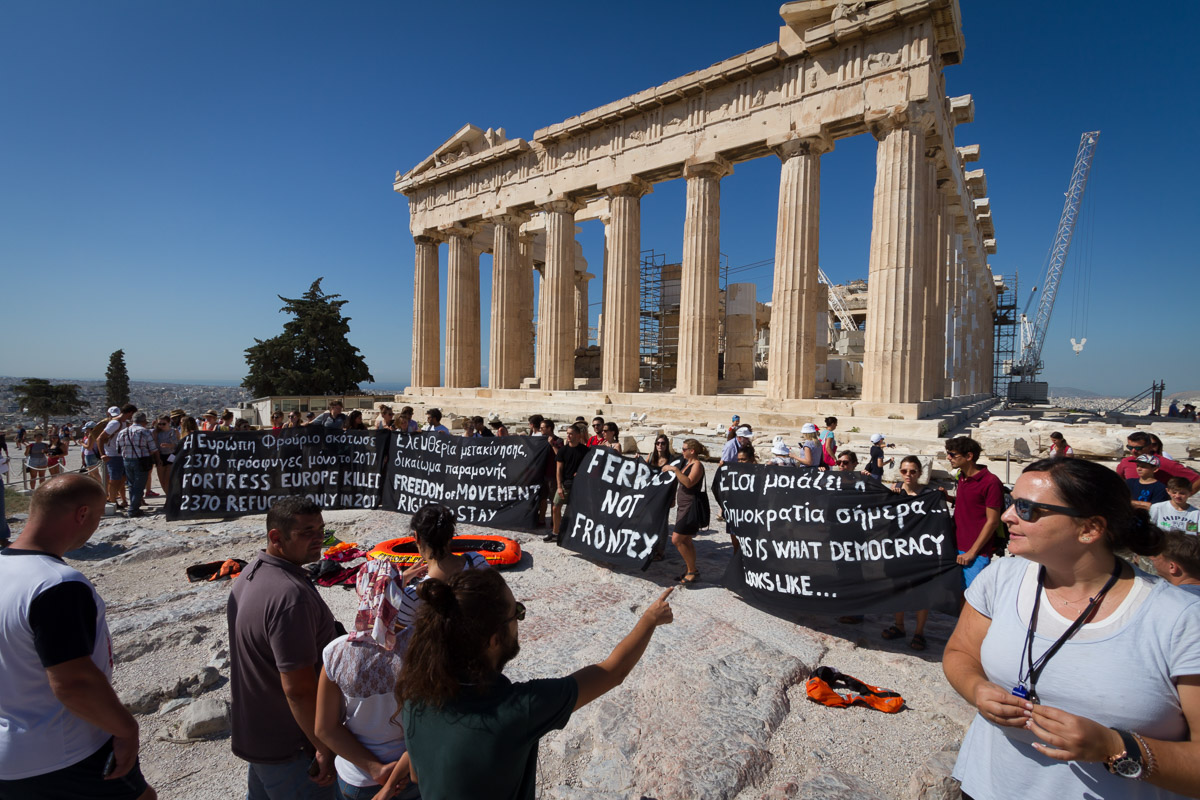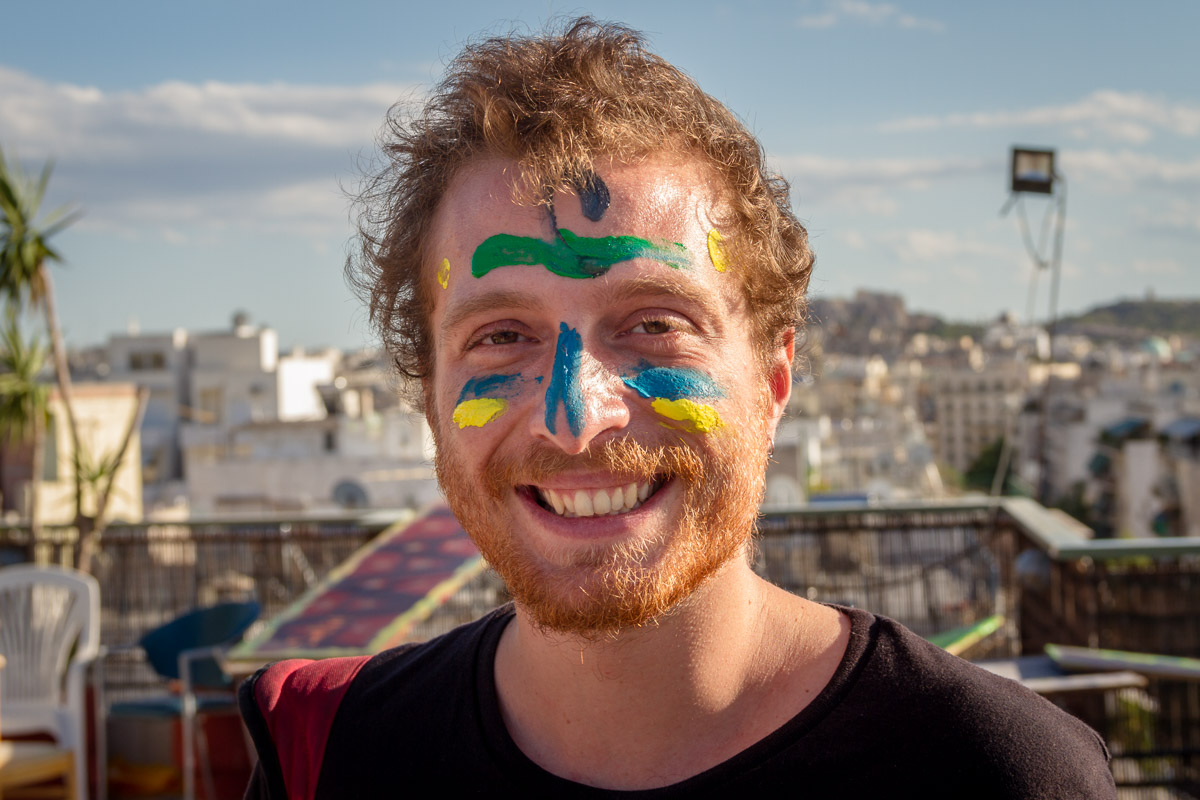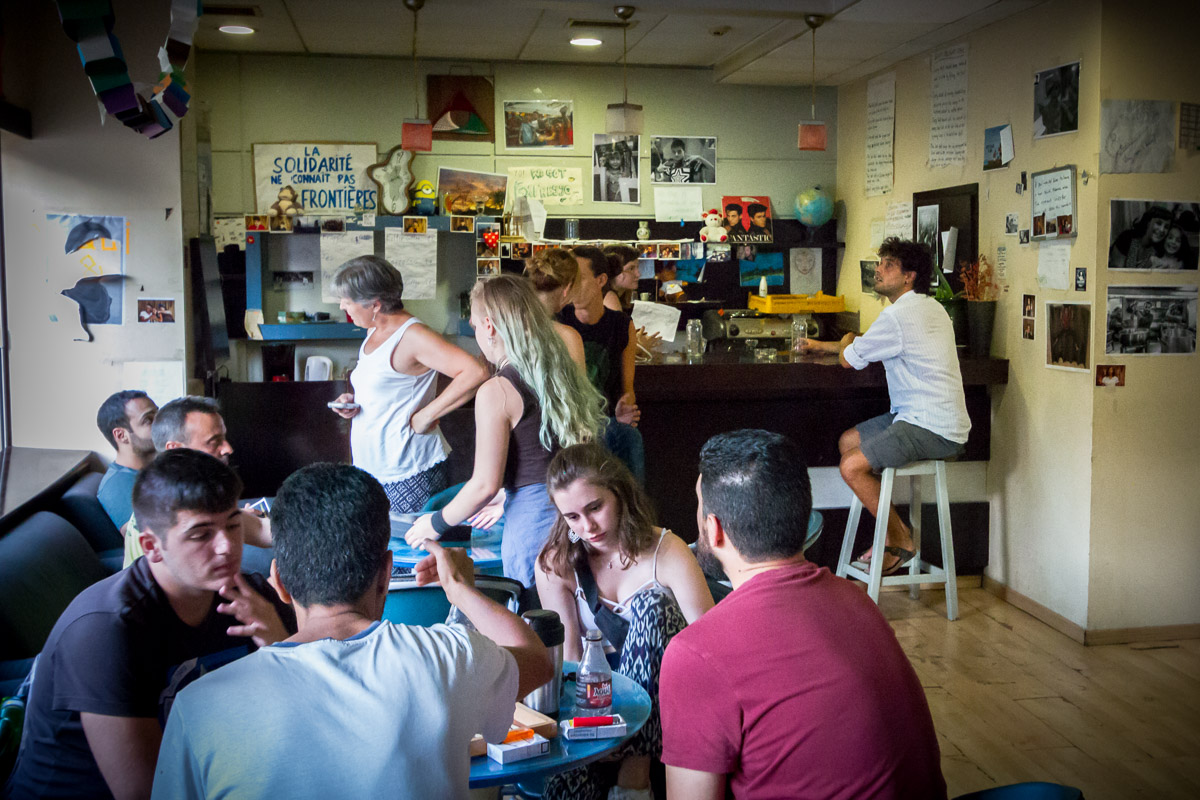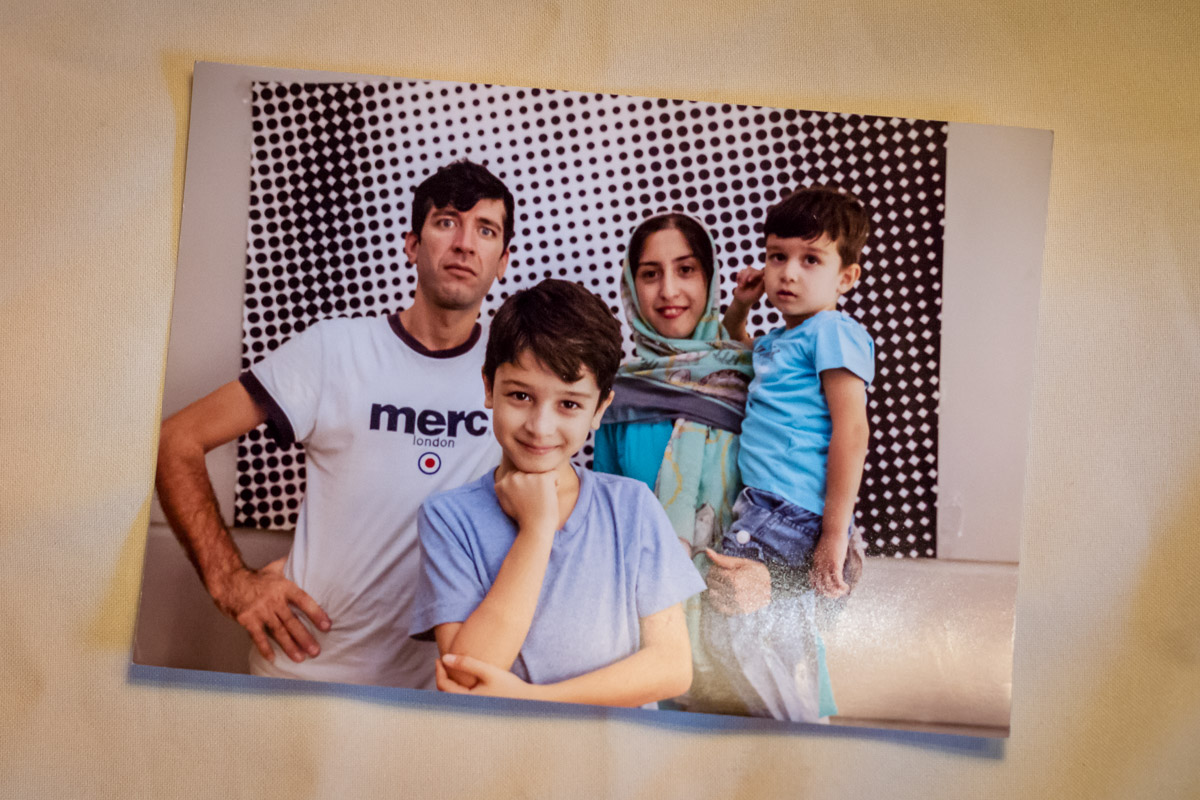WE'LL COME UNITED

Athens (GR), Aug 2017. Much has been written about the self-sustained project based in the former City Plaza hotel in Athens. Studied by the academic world and followed by international media, it has by now become a role model in the alternative welcome process of asylum seekers in Europe and beyond. Indeed, City Plaza (CP) is not just like any other shelter, born to provide help and accommodation where the government action does not or cannot reach. It is rather the result of a common mindset based on grassroots planning and solidarity, the outcome of DIKTYO's (Network for Social and Political Rights) 20 years-long commitment. With its experience, this independent network part of the Greek far-left scene proposes a formula of social organisation based on a model of self-coordination and horizontal collaboration, instead of a traditional hierarchical one. These values have eventually developed in 2016 in the "Refugee Accommodation and Solidarity Space City Plaza" project.

On April 22nd, CP celebrated its 18 months of life. During this time, the structure has seen more than 1,700 residents passing through its 126 rooms (of which 26 reserved to the staff), between volunteers and asylum seekers. The building was unused for seven years following the business declared bankruptcy. It was squatted in 2016 by a group of activists and migrants, including DIKTYO, SYRIZA's Youth, and Antarsya, a radical leftist group from Athens. Shortly afterwards, given the advanced self-organisation developed by CP, the three groups decided to step back in the management of the structure, passing the lead on to the local team living inside the former hotel, while keeping alive the political support.
The building is now able to accommodate about 400 people, or about one hundred families. The priority over the right to reside in CP is given on the basis of the family's or person's previous placement (which most of the times is the street) and on necessities due to particular problems or difficulties. Rooms and beds are then allocated with particular attention to ethnic and religious origin, in order to maintain a certain heterogeneity and avoid clusters.

Since the beginning, this experiment of self-governance has been organised through a series of weekly meetings based on the concept of shared coexistence and work. These meetings are open to everyone living and working here, in order to develop collective solutions from every possible perspective. In this regard, the goal is to put into practice an idea of everyday life able to empower the individual. Therefore, CP achieves this through the active collaboration of volunteers and residents, while being economically supported only by private donors from all over the world.
However, the project struggles to survive in a constant context of uncertainty. On one side the threat of eviction represented by the police is always present, on the other Golden Dawn and other far-right groups contribute to keep a constant level of tension with their violent acts of intimidation. In these circumstances, equally shared with at least twelve more squats across the neighbourhood of Exarchia and many more refugee camps throughout Greece, CP is trying to create an anti-racist network of solidarity and resistance. Eventually, the plan is that to organise a self-reliant and collective struggle able to influence the decision-making process concerning the European migrants crisis. From this point of view, this occupation can be seen as a concrete action aimed at claiming back social and political rights for asylum seekers, as well as an act of resistance against migration policies imposed by the EU, such as the infamous "Europe-Turkey agreement" signed in March 2016. In this way, CP represents a counter-proposal to the housing problem to which institutions respond by creating refugee camps and hotspots, often lacking the most basic services.

Two years ago, migratory waves triggered by the advance of ISIL, the Syrian War as well as other situations of instability across Africa and the Middle East, managed to cross the European borders. In 2015 this mass migration coming from contexts of continuous humanitarian crisis already counted 7 million people from Syria only, the greatest since the end of World War II. The decision taken by European countries was that to shut their borders to prevent undocumented travel and terrorism infiltration, blocking more than 60,000 refugees in Greece as of 2016, a country already struck by economic recession and financial austerity.
It was in this climate of emergency that CP was born and now stands, trying to set up a resistance and solidarity beacon with the slogan "refugees welcome", as an alternative to more than 49 state managed structures between detention centres and hotspots. "We live and struggle together, solidarity will win" is CP's motto. no longer a simple hotel but a home for a big cosmopolitan family which came together after the eviction of nearby Vitctoria Square, back then one of the main arrival spots for asylum seekers in Athens. The duration of the stay is diverse and can range from a few days to several months, depending on the time needed for the preparation of the documents for family reunification or migration.

As soon as we arrive, we are welcomed through the introductory meeting, one of the various collegial moments that regulates CP's life. During the meeting, Malik explains the basic rules that regulate the hotel, then proceeding to describe the various activities that take place during the day. The rules of coexistence are few, but clear and mandatory: 1. No violence, no discrimination, no alcohol and no drugs allowed; 2. Things must never be allowed to escalate in order to keep the place safe and smoothly-running for the respect of everyone; 3. Everyone able to, has to contribute in a shift of choice at least once a week on a 45 hours weekly schedule. The respect for these rules is ensured by the active participation of all residents to the life of the community. This organisation allows the residents to change their position from one of passive subjects of a supportive approach, to that of individuals actively involved in their own struggle. It is eventually amazing for an external observer to see how all this comes together and more than 400 people of different ethnicity, age, and social extraction manage to live together in a well-organised and peaceful context.
To this goal, day-by-day management is also ensured by few but fundamental activities organised in shifts. Mixed teams made up of volunteers and residents carry out daily tasks aimed at ensuring the preparation and distribution of meals, the cleaning of premises, and the supervision of the building 24/7. For this reason, those who live in CP have two cards: one for identification, which grants access to the building, and a second one which is used for the collection of food in the common dining hall.

Decisions are always taken through democratic means and collective discussion, such as coordination and solidarity meetings, the latter specifically dedicated to volunteers (also called "solidarians"). In addition to them, CP is also kept running by the constant presence of long-term volunteers and a group of activists belonging to the collective which supports the occupation.
Giovanni, 23, is an Italian volunteer. He comes from Turin, where he is currently studying Anthropology of Migrations at university. After reading several articles about CP, driven by curiosity and the desire to help, he arrived in Athens about 10 months ago thinking of staying for just a week. Eventually, postponing month after month, he is still here, where he mainly organises the activities of the Kid's Corner, managing the space dedicated to the children living in the hotel.

The Kid's Corner is not only a space dedicated to kids, but it is also a resource provided to those parents who cannot afford a nursery or, being alone or having daily commitments, cannot take care of their children on a full-time basis. Therefore, this is a place where children are given the opportunity to play in a safe and controlled environment, as well as attend educational activities. Indeed, among the latter the Kid's Corner organises basic English classes, visits to museums, day-out trips with the families, and last but not least activities in parks. Giovanni tells us that most of the children come from Afghanistan. Although many have already been refugees in Iran, they have always stayed with their families. In this regard, unlike other squats or refugee camps in Athens, there are here only five unaccompanied minors. This is because CP feels it is best for them to be hosted in structures that are more appropriate to their needs and receive dedicated care.

Vittoria too comes from Turin, she is 22 and in Italy is reading Psychology as a master student. She says she arrived to City Plaza with Giovanni in 2016, and it took her a while to get used to the different cultures and habits present in CP. The most difficult part, Vittoria adds, was getting used to both the calm and jovial environment, and the pain and private suffering of the people living here, two sides of the same coin. As a volunteer, she mainly takes care of the Women's Space, the space she has created and developed, exclusively dedicated to the women of the hotel.
Vittoria's approach shows the constant complexity of articulating the activities of the Women's Space on the ever-changing women's needs, which also requires a certain level of experimenting with different forms of organisation. In this regard, starting the project was for her a real challenge, which has developed through trial and error. "At the beginning it was quite hard to have people coming in, but eventually the project took off with a series of workshops on how to make facial masks with material available from the kitchen", Vittoria says. "From there, inspiration has come despite the linguistic limitations [editor's note: unlike men many women have received little or no education in their countries of origin], and the fact that women rarely leave their rooms outside meal times [...]. If there is a way to make them more confident and open, that is exactly to follow their line of thought", Vittoria adds. Hence the decision to support their requests rather than make pre-packaged proposes for what concerns the activities. Thus, for example, English classes have been organised exclusively for women, allowing them to overcome cultural barriers concerning mixed-sex classes. Instead, other topics concerning more specific and delicate issues such as sex or women's emancipation have been avoided after they were met unenthusiastically.

Germany is the main destination for most asylum seekers now living in Greece. In 2011, the German Constitutional Court decided to suspend the Dublin III Regulations (Regulation 604/2013) for five years, thus allowing refugees to reach Germany despite the fact that asylum applications should be evaluated in the first European country of arrival. But times change and Germany has now announced that intends to reintroduce regulations to limit immigration, with more than 400 people already identified to be returned to Greece.
Furthermore, the European resettlement program for asylum seekers arrived in Greece and Italy has been applied with such restrictive eligibility criteria, that the number of people who have been granted access to other European countries has drastically reduced since the first projections. In fact, only people coming from Iraq, Eritrea and Syria have been considered vulnerable (this the term used in the program) and thus made eligible for asylum procedures. In the meantime, the resettlement plan ended on September the 26th, with results far from being satisfactory. According to recently released UNHCR statistics, out of 160,000 asylum seekers envisaged by the program, of which 106,000 from Greece and Italy, only 29,144 have been relocated: 20,066 from Greece and 9,078 from Italy.

UNHCR therefore has called on Europe to renew the program modifying the criteria currently considered too limitative. However, to date no response has been received. In short, European policies of border sealing and travel restriction have developed into a stalemate in which now at least 62,000 asylum seekers are trapped. In this sense, Greece has become a testing ground for the EU management of migratory flows, with the purpose of dramatically reduce arrivals to mainland Europe. This is one of the few causes that can justify the current situation of overcrowding in the Hellenic islands, which have now become home to dozen of hotspots and refugee camps. By doing so, the EU has therefore quietly created a buffer zone around its outer borders, to be used as a confine zone for the "migrant" issue. A sheltering strategy similar to that already taking place in Libya after the recent agreements taken with Italy.
That is also the reason why in the political and social context of Athens, activists and residents of CP are constantly seeking moments of encounter with the community. By actively participating in its daily life, they can make their voices heard and their situation noticed. Examples of this plan of action are open dinners with the neighbourhood and participation to urban redevelopment schemes. Awareness is also raised among tourists, as highlighted by the recent demonstrations held at the Acropolis and the tourist district of Monastiraki. Held on a weekly basis are instead the protests held in front of the asylum offices in the Athenian neighbourhood of Katehaki.

Many families live in CP while waiting for the documents necessary for the process of family reunification. Karima, 27, is there with his brother Hamed and her two sons, 10 and 5 years-old. She is Afghan but was born in Iran, the country she eventually fled from because of the discrimination to which Afghan people are subjected to. In the Persian country, Afghan emigrants do not have the right to acquire Iranian citizenship and can only have temporary documents, which needs to be renewed every six months. Furthermore, access to public services such as schools is extremely limited and possible only after hefty payments. This situation is even more difficult to face for women, who often find themselves isolated due to their restricted position in a strict and patriarchal society.
In Iran Karima refused a combined marriage with her cousin and because of that she and her current husband were persecuted and forced to flee. She has been now living in CP for about a year and a half, still waiting to get reunited with her husband who managed to arrive to Germany and receive medical treatments unavailable in Greece. Speaking of the current situation, she thinks that it is not right that Europe discriminates between nationalities of those who seek asylum, she just would like to have her basic human rights guaranteed for herself and her children. In CP this is most people's opinion as many have been in her same situation for days, weeks or even months. For them this place represents a sanctuary, a safe harbour where they can recover and prepare for the next part of their journey.

Despite the many positive results achieved the eviction threat is always around the corner for CP, with the owner of the building going as far as to sue the Greek chief of police for "dereliction of duty" for not having shut down the illegally occupied property. Her efforts eventually delivered some results and on May the 17th a request of eviction was officialised for CP and two other squats of the capital, of which occupants were informed only weeks later through the press.
In Greece, in line with the current circumstances set by European policies, CP remains the best alternative to refugee camps and hotspots where tens of thousand of asylum seekers live in extremely precarious conditions, not only for what concerns health and hygiene but also accommodation and food. Therefore, CP demonstrates that another model of welcome process is possible, one based on grassroots organisation and horizontal solidarity, built on human values of urban inclusion rather than seclusion and isolation.

